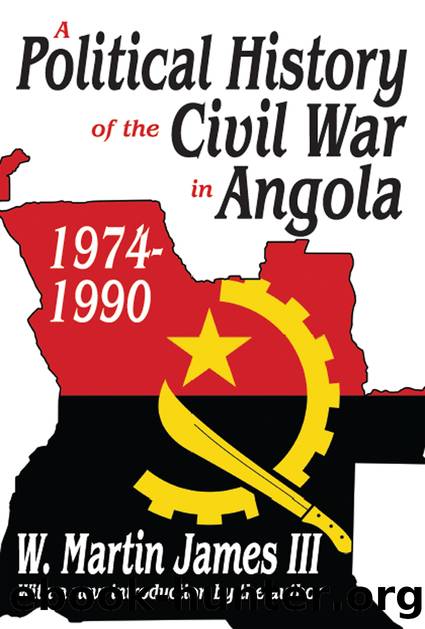A Political History of the Civil War in Angola: 1974 - 1990 by W. Martin James

Author:W. Martin James [James, W. Martin]
Language: eng
Format: epub
Tags: Nonfiction, Social & Cultural Studies, Political Science, International, Treaties, Politics, Practical Politics
ISBN: 9781351534666
Google: sa1yAgAAQBAJ
Goodreads: 14316891
Publisher: Taylor and Francis
Published: 2020-05-04T04:00:00+00:00
The Emergence of Constructive Engagement
The United States had taken an active interest in southern Africa since the election of Ronald Reagan in November 1980. South Africaâs aggressiveness and stubbornness can be traced to the U.S. presidential election. In December 1980, Senator Richard Lugar (R-Ind.) had written an article calling for the United States to seek withdrawal of foreign forces from Angola, free democratic elections, and continued nonrecognition of MPLA-PT rule of Angola. In addition, he argued, â⦠the United States should now throw its considerable moral support behind Savimbi.â41
Two months after his inauguration, President Reagan alerted Capitol Hill of his intention to seek repeal of the Clark Amendment. The Carter administration had sought repeal based on academic or constitutional dogma concerning the right of Congress to limit the foreign policy capability of the presidency. The Reagan administration, on the other hand, had publicly called for support of UNITA and punishment of Cuban involvement in the Third World.
Secretary of State Alexander Haig testified before the Senate Foreign Relations Committee March 19, 1981, proposing as a âquestion of principleâ that the Clark Amendment be lifted. In April, Dick Clark, no longer a U.S. Senator, wrote a column outlining four reasons why his amendment should be retained. First, the United States would not be able to lure Angola from the Soviet/Cuban orbit. Second, repeal would end hope for a Namibian settlement. Third, repeal would injure relations with all African nations. Finally, repeal would encourage Soviet/Cuban adventurism.42 On May 12, the full Committee on Foreign Affairs voted 19 to 5 to reject the administrationâs request with respect to the Clark Amendment.
The next day, the Senate Foreign Relations Committee voted 10 to 2 to repeal the amendment. Once again, the House and Senate took differing positions on assistance to UNITA.43
By October, the Senate version of the foreign aid bill was voted on by the full Senate. The repeal of the Clark Amendment was approved 66 to 29, but House leaders continued their opposition. On December 9, the House considered the foreign aid bill, but a motion to delete the Clark Amendment was not brought to the floor for a vote. Representative Ed Derwinski (R-Ill.) declined to bring the matter to a vote, fearing a negative result. The Senate amendment was never acted upon.
Download
This site does not store any files on its server. We only index and link to content provided by other sites. Please contact the content providers to delete copyright contents if any and email us, we'll remove relevant links or contents immediately.
| Central Africa | East Africa |
| North Africa | Southern Africa |
| West Africa | Algeria |
| Egypt | Ethiopia |
| Kenya | Nigeria |
| South Africa | Sudan |
| Zimbabwe |
Goodbye Paradise(3810)
Men at Arms by Terry Pratchett(2836)
Tobruk by Peter Fitzsimons(2516)
Borders by unknow(2313)
Arabs by Eugene Rogan(2299)
Pirate Alley by Terry McKnight(2221)
More Than Words (Sweet Lady Kisses) by Helen West(1867)
Belonging by Unknown(1855)
It's Our Turn to Eat by Michela Wrong(1730)
The Biafra Story by Frederick Forsyth(1656)
The Source by James A. Michener(1613)
Botswana--Culture Smart! by Michael Main(1601)
Coffee: From Bean to Barista by Robert W. Thurston(1544)
A Winter in Arabia by Freya Stark(1538)
Gandhi by Ramachandra Guha(1531)
The Falls by Unknown(1525)
Livingstone by Tim Jeal(1489)
The Shield and The Sword by Ernle Bradford(1409)
Africa: Altered States, Ordinary Miracles by Richard Dowden(1384)
